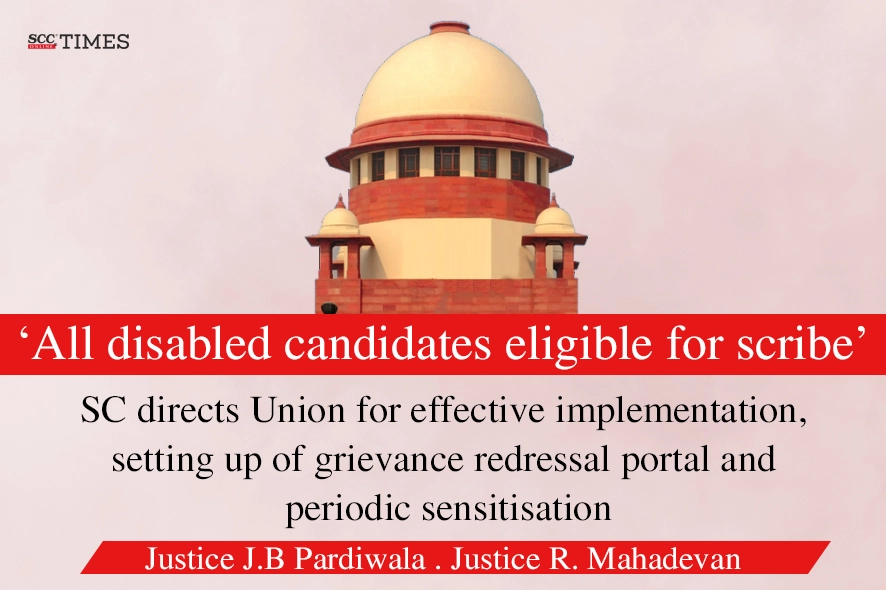Supreme Court: In a writ petition filed as Public Interest Litigation, seeking a writ of mandamus directing the respondents to provide the petitioner with the facility of a scribe, compensatory time, and all other facilities, to which he may be entitled, considering his disability status for the upcoming examinations, the Division Bench of JB Pardiwala and R. Mahadevan*, JJ. allowed the petition and held that all disabled candidates are entitled to use scribes for writing exams, without meeting the previously required benchmark disabilities criteria in light of Vikas Kumar v. Union Public Service Commission (2021) 5 SCC 370, wherein, it was held that it would be discriminatory to restrict the facilities of a scribe for only PwBD candidates.
Background
The petitioner was diagnosed with Focal Hand Dystonia, a type of Writer’s Cramp, classified as a chronic neurological condition. Under the Rights of Persons with Disabilities Act, 2016 (RPwD Act, 2016), he was assessed with 25% permanent disability and a Unique Disability ID was issued by the Primary Health Care Centre, Rajgir, Nalanda, Bihar. On 12.07.2021, after evaluation, the National Institute of Mental Health and Neuro-Sciences Centre (NIMHANS), Bangalore, issued a certificate in favour of the petitioner recognising his need for a scribe in written examinations. He applied for various examinations conducted by different recruitment bodies; however, he was not provided with any facilities available to PwD candidates. According to him, such facilities were restricted only to the Persons with Benchmark Disabilities (‘PwBD’).
The petitioner also sought a direction to the Respondent 5 to initiate suitable action against the examining bodies that failed to adhere to the guidelines issued by the Government of India, Ministry of Social Justice and Empowerment, Department of Empowerment of Persons with Disabilities (Divyangjan) vide Office Memorandum dated 10-08-2022.
Analysis and Decision
The Court noted several provisions of the RPwD Act, 2016, such as Section 2(m), Section 2(y), Section 2(h), Section 2(s), Section 2(r), Section 16, Section 17, and Section 18, which emphasize the rights of disabled persons to participate in examinations with necessary accommodations.
Further, the Court referred to several landmark judgments, which have reinforced the rights of PwD. Referring to Vikas Kumar (supra); Avni Prakash v. National Testing Agency (NTA) 2021 SCC Online SC 1112 and Arnab Roy v. Consortium of National Law Universities, (2024) 5 SCC 793, the Court reiterated that the principle of reasonable accommodation is central to ensure equality for all persons with disabilities; and denying the facility of a scribe or compensatory time constitutes discrimination under the RPwD Act, 2016. The Bench also said that the Court wishes to diminish the artificial distinction and bifurcation drawn between candidates with disabilities and those with benchmark disabilities (40% disabled or more) by extending various rights to candidates with disabilities that were earlier limited only to those with benchmark disabilities.
The Court also referred to Judgments from foreign jurisdictions such as Moore v. British Columbia (Education)1; Mental Disability Advocacy Center (MDAC) v. Bulgaria2 and noted that the rights of disabled persons are less instructive and more general and that, the right to education, right to equality, and right against discrimination accorded to them will only be truly realized, when State structures form policies, laws, and rules to provide equal access and reasonable accommodation to such persons.
The Court noted that the Office Memorandum dated 10-08-2022 was issued in compliance with the directions issued by this Court in Vikash Kumar (Supra), wherein, guidelines were issued for conducting written examination for persons with specified disabilities covered under the definition of Section 2(s) of the RPwD Act, 2016, but not covered under the definition of Section 2(r) of the said Act, i.e. persons having less than 40% disability and having difficulty in writing.
The Court considered the petitioner’s submissions as to the defects in the said memorandum which failed to incorporate the essence of reasonable accommodation. The Court also took note of the problems and inconveniences faced during the examination process, which are as follows: (i) The application forms for recruitment did not include provisions for PwD candidates, and the requisite facilities were only provided upon specific requests from applicants; (ii) Compensatory time was not displayed on the screen, leading to a failure by the invigilators to provide the facility to PwD candidates; (iii) Some recruitment agencies refused to provide the facilities of a scribe and extra time to PwD candidates, citing that such provisions were contrary to the policy decisions of their respective departments; (iv) In certain cases, the facilities of a scribe and extra time were denied because the invigilators were not informed about the court orders mandating strict compliance with such provisions; (v) In various examinations, the benefits were provided only to PwBD candidates, due to a lack of coordination and proper implementation.
In light of the petitioner’s submission that there have been instances where examination bodies refused to extend the benefits available to PwD candidates due to the absence of a clear-cut grievance redressal mechanism, which continues to cause inconvenience and injustice to several candidates; that there are certain defects and lacunas in the guidelines issued by Respondent 5/ Government of India, Ministry of Social Justice and Empowerment, Department of Empowerment of Persons with Disabilities (Divyangjan), as well as in the implementation of the Court’s directions, resulting in different authorities following disparate procedures, the Court stated that this lack of uniformity causes confusion, discrimination, and undermines the efficiency and effectiveness of the examination process, hence, there was an urgent need for a uniform memorandum for examinations applicable to all PwD candidates, and it is the responsibility of Respondent to ensure its proper and just compliance.
The Court also dismissed the contention of the Respondent 1 that they were not amenable to writ jurisdiction, on the basis of Kaushal Kishor v. State of Uttar Pradesh3 holding that rights under Articles 19 and 21 can be enforced even against private entities. The Court also highlighted that the Office Memorandum clearly stated that the guidelines are applicable to all the authorities and the benefits conferred by the statute should be provided for all the PwD candidates and they cannot be denied on the ground of absence of accountability and/or lack of duty on enforceability.
Therefore, the Court held that the guidelines issued by Respondent 5 pursuant to the directions of this Court, have to be enforced, by extending the benefits for PwBD candidates to all PwD candidates in writing their examinations, without any hindrance. Accordingly, the Court directed the Respondent 5 to revisit the Office Memorandum dated 10-08-2022, remove the restrictions and reasonably grant relaxations, and incorporate the following aspects:
-
direct all the authorities/recruitment agencies / examining bodies to uniformly follow the guidelines issued by Respondent 5, which is the nodal agency, and ensure strict adherence through periodic surveys/verification;
-
carry out periodic sensitisation drives at educational institutions to raise awareness among the examination conducting bodies so as to ensure that the OMs are effectively implemented;
-
set up a grievance redressal portal to register complaints, which would permit the candidates to approach it first before approaching the court of law;
-
inspect the guidelines framed by different authorities and re-notify the existing guidelines with an aim to ensure compliance;
-
extend the validity of the scribe certificate (currently being valid only for 6 months) to prevent the long wait time after applying, especially, in rural areas;
-
set up Incentive programs for scribes to ensure their availability and provide necessary training;
-
provide some time prior to the examination to allow the candidates to familiarize themselves with the scribe to ensure that there is a sense of comfort while communicating with the scribe during the examination;
-
offer PwD candidates a choice of examination modes, such as scribe, braille, large print, audio recording of answers, etc.;
-
take penal action against authorities/officials in charge of decision-making process, who fail to follow the guidelines set out by Respondent 5 and formulate guidelines which exclude PwD;
-
sensitise the persons working for the respondent authorities, and train them on a regular basis, to address the reasonable accommodation needs of PwDs; and (xi) ensure strict compliance with the letter and spirit of the judgments in Vikash Kumar and Avni Prakash as well as the provisions of the RPwD Act, 2016, with a special focus on ‘reasonable accommodation’.
CASE DETAILS
|
Citation: Appellants : Respondents : |
Advocates who appeared in this case For Petitioner(s): For Respondent(s): |
CORAM :
1. [2012] 3 S.C.R.
2. Decision in Complaint No. 41/2007 dated 03.06.2008.
3. Writ Petition (Criminal) No. 113 of 2016.








